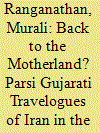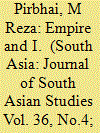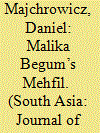| Srl | Item |
| 1 |
ID:
189067


|
|
|
|
|
| Summary/Abstract |
The publication of four Gujarati travelogues written by Parsis traveling to Iran in quick succession in the 1920s marked the intensification of a relationship that had hitherto been based mainly on philanthropy directed towards the Zoroastrians of Iran. The Pahlavi regime, with its assurances of religious tolerance and equity, prompted Parsis to consider deepening their connection with Iran through trade and business investments and also examine the possibility of return to their motherland. The encounters which constitute these travelogues could be framed as experiments which helped the Parsi community in India to construct a framework for developing this relationship. The Parsi travelogues, while attempting to recover a Zoroastrian past in Iran, also try to map the future for the community by addressing its present anxieties and aspirations.
|
|
|
|
|
|
|
|
|
|
|
|
|
|
|
|
| 2 |
ID:
126174


|
|
|
|
|
| Publication |
2013.
|
| Summary/Abstract |
Framed in a discussion of post-colonial approaches to the British Empire's influence on culture, a close reading of Captain Donald Campbell's late eighteenth-century travelogue contextualises the personal particularities in his assessments of Habsburg Europe, Ottoman West Asia and Mysorean/British South Asia. His is an imagination in which the bonds of 'religion' ameliorate the 'otherness' of continental Europeans, while his concept of 'enlightenment' learning is deployed to understand the Ottomans. Only in the case of South Asia is the very humanity of the 'other' denied. I argue that this landscape of otherness reflects the coincidence of the interests of his 'self' and the 'Empire', which overlap most thoroughly in South Asia. Campbell's travelogue is of value to post-colonial approaches, as it is a particularly poignant example of the manner in which the particularities of the 'self' contribute to the construction of broader cultural discourses permeated by 'Empire'.
|
|
|
|
|
|
|
|
|
|
|
|
|
|
|
|
| 3 |
ID:
175484


|
|
|
|
|
| Summary/Abstract |
Ostensibly, Muslim women in colonial India only rarely wrote travel narratives, particularly in Urdu. In truth, women’s travel writing in Urdu is anything but chimerical, but persistent archival and methodological limitations have led to the neglect and even irrevocable loss of this writing. A recalibrated approach to travel writing and archival practices divulges a vast corpus—but only if we attend to the specific ways in which women’s narratives were produced and circulated. This article offers a primary typology of the formats and fora most often employed by women writing in Urdu, including semi-private (but orally consumed) letters, family newspapers and women’s journals. Using extensive quotations from previously unknown sources, it reintroduces a forgotten corpus to the study of Indian history, literature, and gender studies alike.
|
|
|
|
|
|
|
|
|
|
|
|
|
|
|
|